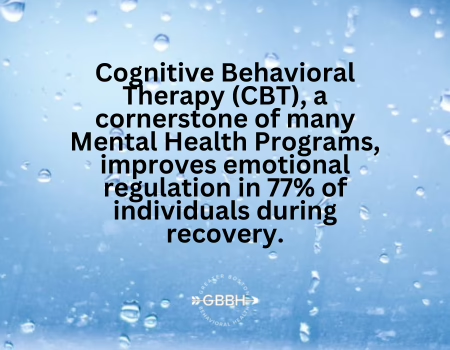Recovery is a journey that extends beyond overcoming substance use or addressing mental health symptoms. It’s about achieving holistic mental wellness and regaining balance in all areas of life. During recovery, mental health plays a crucial role in maintaining sobriety, fostering resilience, and building a fulfilling future.
At Greater Boston Behavioral Health (GBBH), we support individuals on their recovery journey through a range of personalized programs, including Mental Health Programs, Anxiety Treatment Programs, and Trauma Therapy Programs. This guide explores the importance of mental wellness during recovery, strategies to achieve it, and the resources available to support your success.
The Connection Between Mental Health and Recovery
Mental health and recovery are deeply interconnected. Addressing underlying mental health conditions is essential for sustaining sobriety and achieving overall well-being. Common challenges during recovery include:
- Dual Diagnosis: Many individuals in recovery face co-occurring mental health disorders, such as depression or anxiety, alongside substance use disorders.
- Emotional Dysregulation: Recovery can trigger intense emotions, requiring tools to manage them effectively.
- Social and Environmental Stressors: Navigating relationships and triggers during recovery can impact mental health.
Focusing on mental wellness helps build the emotional resilience needed to navigate these challenges and sustain long-term recovery.
Key Components of Mental Wellness During Recovery
Achieving mental wellness involves more than addressing symptoms; it requires a holistic approach that encompasses emotional, physical, and social well-being. Here are the essential components:
1. Prioritizing Mental Health Care
Seeking professional support for mental health conditions is a cornerstone of recovery. At GBBH, we offer comprehensive services, including:
- Anxiety Treatment Program: Managing anxiety and worry that may arise during recovery.
- Depression Treatment Program: Addressing symptoms of depression that can hinder progress.
- Trauma Therapy Program: Helping individuals process unresolved trauma that contributes to addiction or emotional challenges.
Professional care ensures that underlying mental health issues are treated alongside recovery efforts, creating a stable foundation for success.
2. Developing Healthy Coping Mechanisms
Recovery often requires replacing unhealthy coping mechanisms with healthier alternatives. Tools to manage stress, cravings, and emotions include:
- Mindfulness Practices: Techniques like meditation, deep breathing, or yoga to stay present and reduce stress.
- Cognitive Behavioral Therapy (CBT): Identifying and reframing negative thought patterns.
- Creative Outlets: Engaging in art, music, or writing to process emotions and express oneself.
Incorporating these strategies into daily life can prevent relapse and enhance emotional resilience.
3. Strengthening Support Systems
Social support is a vital component of recovery and mental wellness. Building a strong support network can:
- Reduce feelings of isolation.
- Provide accountability and encouragement.
- Offer a safe space to share experiences and challenges.
At GBBH, our Group Therapy Programs foster connection and peer support, helping individuals build meaningful relationships in recovery.
4. Enhancing Emotional Regulation
Emotional regulation is critical for managing the highs and lows of recovery. Strategies to improve emotional well-being include:
- Journaling: Reflecting on emotions and experiences to gain insight and clarity.
- Self-Compassion: Practicing kindness toward oneself during difficult moments.
- Anger Management Programs: Learning techniques to manage frustration and conflict constructively.
These tools help individuals navigate recovery with greater stability and confidence.
5. Maintaining Physical Health
Mental and physical health are closely linked. Prioritizing physical well-being supports emotional resilience and recovery success. Key practices include:
- Regular Exercise: Boosting mood and energy levels through physical activity.
- Balanced Nutrition: Fueling the body with nutrient-rich foods that support brain health.
- Adequate Sleep: Ensuring restorative rest to improve focus, mood, and overall well-being.
In our Partial Hospitalization Programs (PHP) and Intensive Outpatient Programs (IOP), we emphasize the importance of integrating physical health into mental wellness plans.
6. Addressing Triggers and Stressors
Understanding and managing triggers is crucial for maintaining recovery. Common triggers include:
- Social environments that encourage substance use.
- Stressful situations or conflicts.
- Unresolved trauma or emotional pain.
Through Trauma Therapy Programs and individualized care plans, we help clients identify triggers and develop effective strategies to manage them.
Strategies for Sustaining Mental Wellness in Recovery
Mental wellness is an ongoing journey that requires consistent effort and adaptability. Here are actionable strategies to sustain mental health during recovery:
1. Create a Daily Routine
Structure provides a sense of stability and purpose, reducing the likelihood of falling into old habits. A well-rounded routine includes:
- Time for therapy and self-reflection.
- Physical activity and healthy meals.
- Scheduled social activities or support group meetings.
2. Set Realistic Goals
Establishing achievable goals creates a sense of accomplishment and motivation. Break larger goals into smaller, manageable steps, and celebrate progress along the way.
3. Stay Connected
Regularly engaging with loved ones, therapists, or recovery groups fosters accountability and emotional support. Programs like Family Therapy at GBBH can strengthen familial bonds and improve communication.
4. Embrace Lifelong Learning
Recovery is an opportunity for growth and self-discovery. Explore new hobbies, skills, or interests that align with your values and goals.
5. Seek Professional Support When Needed
Recovery is not a linear process, and setbacks can occur. If challenges arise, reaching out for professional help can prevent small issues from escalating.
At GBBH, we offer flexible care options, including Mental Health Programs, Group Therapy Programs, and intensive services tailored to individual needs.
The Benefits of Focusing on Mental Wellness During Recovery
Investing in mental wellness during recovery offers numerous benefits, including:
- Enhanced Emotional Stability: Greater resilience in managing stress and setbacks.
- Improved Relationships: Strengthened connections with loved ones and peers.
- Increased Confidence: A sense of empowerment and self-worth.
- Sustained Recovery: A stronger foundation for maintaining sobriety and mental health.
Why Choose Greater Boston Behavioral Health?
At Greater Boston Behavioral Health, we provide a supportive and compassionate environment where individuals can focus on mental wellness during recovery. Here’s why clients trust us:
- Expert Care: Our licensed therapists specialize in treating co-occurring conditions and providing holistic care.
- Comprehensive Programs: From Anxiety Treatment Programs to Trauma Therapy Programs, we offer a wide range of services tailored to individual needs.
- Flexible Treatment Options: Whether through PHP, IOP, or outpatient care, we provide the right level of support at every stage of recovery.
- Convenient Location: As a trusted Mental Health Treatment Center in Boston, we are dedicated to serving individuals across the region.
Conclusion
Recovery is about more than overcoming challenges—it’s about thriving and creating a life filled with purpose and joy. By prioritizing mental wellness, you can achieve lasting success and a brighter future.
Contact Greater Boston Behavioral Health today at (888)278-0716 to learn more about our services, including Mental Health Programs, Family Therapy Programs, and Group Therapy Programs. Together, we’ll help you build the tools and resilience needed for a fulfilling life in recovery.
FAQ on Mental Wellness During Recovery
What is mental wellness in recovery?
Mental wellness in recovery involves maintaining emotional balance, resilience, and overall mental health while addressing challenges related to addiction or mental health conditions.
Why is mental health important during recovery?
Addressing mental health is essential for sustaining sobriety and building a fulfilling life. Untreated mental health issues can increase the risk of relapse and hinder personal growth.
How can therapy help with recovery?
Therapies like Trauma Therapy Programs and Anxiety Treatment Programs provide tools to manage triggers, regulate emotions, and develop healthier coping mechanisms.
What strategies support mental wellness during recovery?
Strategies include maintaining a routine, practicing mindfulness, staying connected with loved ones, and seeking professional support when needed.
What services does GBBH offer to support mental wellness in recovery?
We offer Mental Health Programs, Group Therapy Programs, Intensive Outpatient Programs (IOP), and Family Therapy Programs tailored to individual needs.
Can family members support recovery?
Yes, Family Therapy Programs help loved ones understand the recovery process, improve communication, and provide a strong support system.


